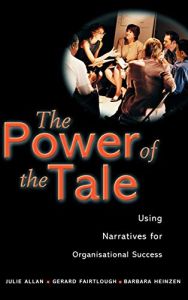Join getAbstract to access the summary!

Join getAbstract to access the summary!
Julie Allan, Gerard Fairtlough and Barbara Heinzen
The Power of the Tale
Using Narratives for Organizational Success
Wiley, 2001
What's inside?
Once upon a time, a company built trust, improved communications and envisioned the future, just by telling stories.
Recommendation
If you think story-telling is just for little kids, three experts - psychologist Julie Allan, biochemist Gerard Fairtlough and consultant Barbara Heinzen - disagree. They have discovered significant value in story-telling within organizations. After briefly describing the multi-cultural history of stories and oral traditions, they dissect the purposes of story-telling, such as increasing rapport, appealing to the emotions and explaining situations. They use seven composite company case studies to demonstrate how stories can build truth and trust, promote learning, develop skills, break new ground and create scenarios you can use in planning the future. These well-intended examples tend to meander confusingly, but you’ll get the point. The last section of the book is devoted to thinking about stories and their uses, an innovative subject that gets little general attention and is the real meat of the text. While the book is very informative and useful, it is not always clear about the purposes of particular stories. getAbstract.com found many helpful lessons about story-telling here, including, unfortunately, a demonstration of the need for sharp editing.
Summary
About the Authors
Julie Allen, a former BBC writer and publisher, is now a chartered occupational psychologist who focuses on sustainable individual and organizational development. Former Shell biochemist Gerard Fairtlough is founder and CEO of the biopharmaceutical company Celltech. He helped establish several other biotechnology and information technology firms. Geographer Barbara Heinzen, a consultant in planning and policy analysis, has worked with a variety of major multinational organizations in Europe, Asia and Africa.

















Comment on this summary